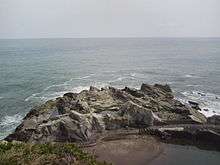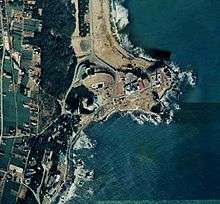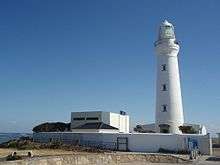Cape Inubō
Cape Inubō (犬吠埼, Inubōsaki) is a cape on the Pacific Ocean, in Chōshi, Chiba Prefecture, Japan. The cape is near the midpoint of the Japanese Archipelago on the island of Honshū.


Origin of name
The name of the cape is constructed from two Chinese characters, the first (犬) meaning "dog", and the second (吠) meaning "howling". Various traditions exist as to the origin of the name, one being that when Minamoto no Yoshitsune's pet dog Wakamaru was left behind on the peninsula, he howled for seven days and nights. Another explanation is that the region was home to numerous Japanese sea lions, whose barking voice resembles that of a dog. The name may also be of ancient Ainu origin.[1]
Geography
Cape Inubō is technically a small peninsula, but is customarily referred to as a cape. While references exist to the Inubō Peninsula, the name has fallen out of use. An extensive marine cave exists in the reef areas under the lighthouse. The cape forms the easternmost point in Chiba Prefecture, close to the mouth of the Tone River. It is part of Suigo-Tsukuba Quasi-National Park.
Inubōsaki Lighthouse
Cape Inubō is noted for its Inubōsaki Lighthouse, built in 1874. It is notable as one of the few lighthouses whose original lens was a first order Fresnel lens, the strongest type of Fresnel lens. It is a Registered Tangible Cultural Property of Japan.
In popular culture
Cape Inubō is mentioned in numerous literary works. Markers related to the poems of Shōwa period author Kyoshi Takahama (1874 – 1959) and Naturalist tanka poet Bokusui Wakayama (1885 – 1928) are on the cape.[2]
The opening logo for Toei Company films features waves crashing over three rocks near Cape Inubō.[3]
Transport
The cape is 10 minutes by foot from the Inuboh Station of the Chōshi Electric Railway Line, or 20 minutes by bus from the JR East Chōshi Station.
 Inubōsaki Lighthouse
Inubōsaki Lighthouse Inubōsaki Lighthouse
Inubōsaki Lighthouse
References
- Chiba-ken Kōtō Gakkō Kyōiku Kenkyūkai Rekishi Bukai (1989), Chiba-ken no rekishi sanpo (1st ed., rev. ed.), Yamakawa Shuppansha, pp. 142–143, ISBN 978-4-634-29120-1
- Chiba-ken Kōtō Gakkō Kyōiku Kenkyūkai Rekishi Bukai (1989), Chiba-ken no rekishi sanpo (1st ed., rev. ed.), Yamakawa Shuppansha, p. 143, ISBN 978-4-634-29120-1
- "Inubo Cape". Japan Travel. Retrieved 2018-02-18.
Sources
"Inubōzaki". Encyclopedia of Japan. Tokyo: Netto Adobansusha. 2011. Archived from the original on 2007-08-25. Retrieved 2011-10-28.